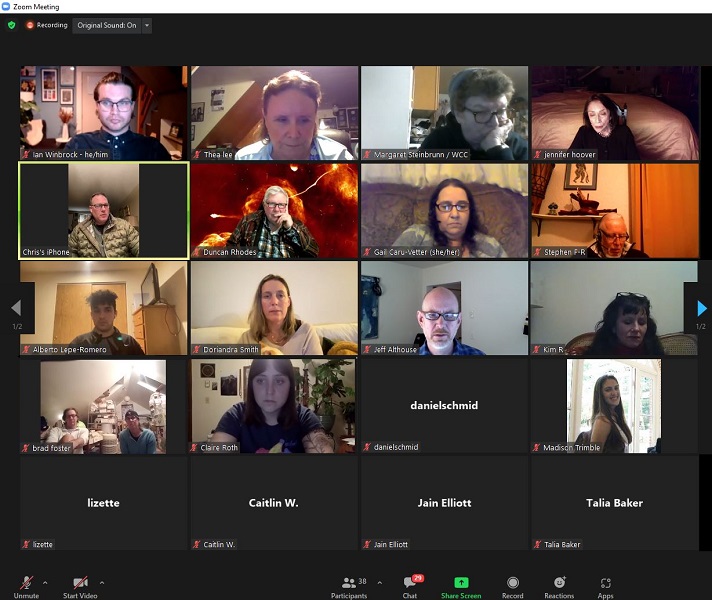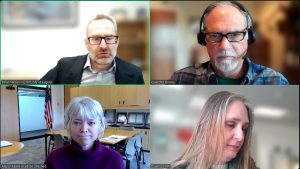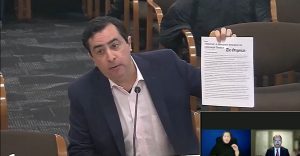Whiteaker asks EPD to help citizens issue speeding citations
8 min read
Eugene Police Chief Chris Skinner took questions from members of the Whiteaker Community Feb. 9.
The residents of one Eugene neighborhood are offering to help the Police Department enforce speeding laws. Welcoming Eugene Police Chief Chris Skinner, Whiteaker board member Thea Lee.
[00:00:10] Thea Lee: I’m Thea. I’ve been on the Whiteaker for, I don’t know, 27 years now or so. And Whiteaker Community Council has been working specifically for the last several years, trying to keep our streets safe for our housed, our unhoused, and our businesses.
[00:00:25] This is about his fourth time coming to the Community Council and people have sent in questions. He’s going to try and answer as many of those as possible. And he’s going to let us know how EPD and the city will be moving forward because we have a lot of people that are preying on our unhoused, our housed, and our businesses. So Chief Skinner, you are up. Thank you for being here.
Thank you for supporting
local civic journalism
[00:00:46] Chief Chris Skinner: Thanks Thea. I do appreciate the questions ahead of time. It gives me a chance to kind of frame where I want to go with some of these discussions. One of the questions that was asked that I think is really important is, and I won’t read it verbatim, but I’ll just tell you, it centered around the Community Safety Initiative which is commonly known as the payroll tax.
[00:01:05] And, just very legitimately asking, what are we getting for our tax dollars? And that’s a legitimate question. And for those of us that pay that tax— me included and all of my employees that work at EPD paying that tax— they want the same answers and have the same questions.
[00:01:21] One of the things I think is important to remember is that the payroll taxes we’ve been collecting for only a year now. And it took us about four to six months to really understand what the collection rate was going to look like. But the first full year of collection of those payroll dollars was intended to pay back an existing loan that we had taken out on the general fund to do some things in the early stages of the Community Safety Initiative. And those things were a 10-person Street Crimes Team to try to deal with some of the street level criminal activity that we have; as many as five Community Service Officers to help try and answer some of the lower acuity calls for service and those calls for service that have a tendency to sit unanswered for way too long. And then a couple of different positions in dispatch to try and give us more dispatchers so that we could give those folks, some help there.
[00:02:09] And so we did that early on and that costs us out of an inter-fund loan to our general fund and our fleet fund to be able to do that. And so government finance requires that we pay that back by the end of the following fiscal year. And so those early payroll collections in 2021 were being paid for that. And so there is a significant number of staff that we have added that I think is helpful around street crimes, paying attention to chop shops and human trafficking and trying to do some stuff in and around WJ as well as throughout the city. They’ve shut down a ton of problem houses. They had the largest single methamphetamine seizure in the state of Oregon history with 384 pounds of methamphetamine, in cooperation with the DEA. And so there’s some really good work that’s being done, but that’s kind of how some of those payroll tax dollars are being spent to date.
[00:02:58] As we move forward, we have a very comprehensive plan of how we invest further investment of dollars to add a variety of things to our response. One of those is to add a significant amount of Community Service Officers to build an alternate response for our patrol staff, free patrol officers up and our police officers up to respond to what police officers should be going to. And allowing our CSOs on a 24 -7 schedule, which has never been happened, never happened before to try and get to the other needs of the community in a much more timely fashion. And I think that will feel better. And so we have just a whole variety of strategies around the Community Safety Initiative but that’s some of the stuff that, how we’re utilizing that payroll tax.
[00:03:41] Thea Lee: Chief Skinner, can you take questions from some of our audience members. We have Brad.
[00:03:46] Brad: Hi Chief. Since you took over as our chief, we passed Vision Zero in the city, and yet we’ve had a doubling of the fatalities of people not in cars on our streets. Cars are going 50 in 30s, cars are going 40 in 20s, nobody’s stopping at stop signs, people drive willy-nilly in the bike lanes. We’ve got a problem on our streets. Oregon Revised Statutes allow for the public to do traffic citations. But it requires the assistance of the police department. Would you be willing to dedicate resources to an enthusiastic public that wants to clean up our streets a bit? Would you be willing to help with that?
[00:04:22] Chief Chris Skinner: I’m always willing to help. And I’m also—it’s important to think about a purposeful and intentional program around and the unintended consequences of getting that very enthusiastic public more engaged. We have to think about capacity, not only with our police officers that can help issue the citation on your behalf. We also have to think about the court system that would be receiving those citations and ultimately make sure the public understands that part of the remedy is that they come and actually testify in court against the offender and that the public has to be able to establish probable cause and those issues and the public doesn’t have necessarily the same technology as we have, to be able to help do that.
[00:05:04] So there’s a few moving parts to that. I’ve helped facilitate a citizen member issue a citation and so I know it can be done and in some cases maybe should be done. But I would be willing to at least sit down and talk about what that kind of a pilot program might look like since we’re talking about so many other resources, like for instance, court resources. I can’t commit prosecutor resources. I would have to check with them and see whether or not they could absorb the volume that this might generate.
[00:05:32] Thea Lee: Next on the list is Stephen.
[00:05:34] Stephen: Chief Skinner, thanks for coming back to talk with us this evening, as always good to see you. Apologies if I’ve asked this question on one of your previous visits. I’ve been a long-time member of the ACLU and one of my concerns is privacy, which is probably in common with many other people in our neighborhood. I was going to ask about two technologies. One is the drones and the other is facial recognition technologies. Have you in the past used either of these two technologies, are you using them now, or do you have plans to use them in the future? So it’s facial recognition technology and drones.
[00:06:12] Chief Chris Skinner: Yeah, thank you for the question, Stephen. I appreciate that. So facial recognition is an easy answer, the answer is no, we have no technology that leverages facial electric recognition and don’t have any plans in the future to leverage facial recognition. There’s plenty of research where that type of technology makes perfect sense, but I’m not sure it makes a lot of sense in community policing.
[00:06:32] Secondly, the drone program is an up and running and very robust program. And drones only get flown under certain circumstances. And in one circumstance it’s when a crime has occurred and we’re using those to help abate that crime or in the investigation phase of that crime or monitoring potential criminal behavior. The other one is mostly the other two would be a search and rescue types of operations in the event that we need to run up and down the Willamette river bank or the rivers, it makes perfect sense to fly. And then the other one is to map crime scenes where we have crime scenes. We can put our drones up on pre-programmed grid patterns, so to speak, and it flies up and down and maps our crime scenes for us. And so those are really the three primary areas that we would use drones.
[00:07:21] John Q: One question asked: ‘I saw you gassing journalists and I saw you settled the ACLU lawsuit. How much has EPD cost taxpayers in civil suits in the last five years?
[00:07:32] Chief Chris Skinner: I don’t have the answer on the total number of an amount of money. What I will tell you is that as a self-insured city, anytime we have one of these lawsuits, we do what I believe to be a very good job of understanding what the potential outcomes are. And we certainly enter into mediation with those people where we’re warranted and then certainly do our work to get summary judgment in the other areas. At least in the early stages of my tenure here, which will be four years come April, we have settled some lower number financial dollar numbers out of the most recent protests. And some of the action that we had in post-May 29th, 2020 and into the summer, we had a couple of, some, a few lawsuits come out of that. And I know that those have been settled. I don’t know the total number of those. It’s not a big number. I think sometimes what happens is we see some of the publication around some of our neighboring cities or neighboring jurisdictions that have settled, massive amounts of lawsuits, and the assumption may be that we’re all in that same posture, and that’s just not the case for Eugene. But we have settled some but the dollar amount is fairly negligible in the grand scheme of things. That being said, it is taxpayer dollars and I’m mindful of that. And I know that I would like to be able to say that we paid zero money out, but that’s just not the case.
[00:08:48] And the use of chemical munitions through the protest have been reevaluated and we made some adjustments to policy, and we learned a lot through that time and have made some adjustments and listened to and heard people when it comes to that. And journalists being embedded with general protestors did happen, but at no time did we purposefully gas journalists as a singular group. So I just wanted to point that out.
[00:09:11] John Q: Chief Skinner took questions at the Whitaker Community Council this week, where neighbors hope to pilot citizen-based traffic enforcement.






